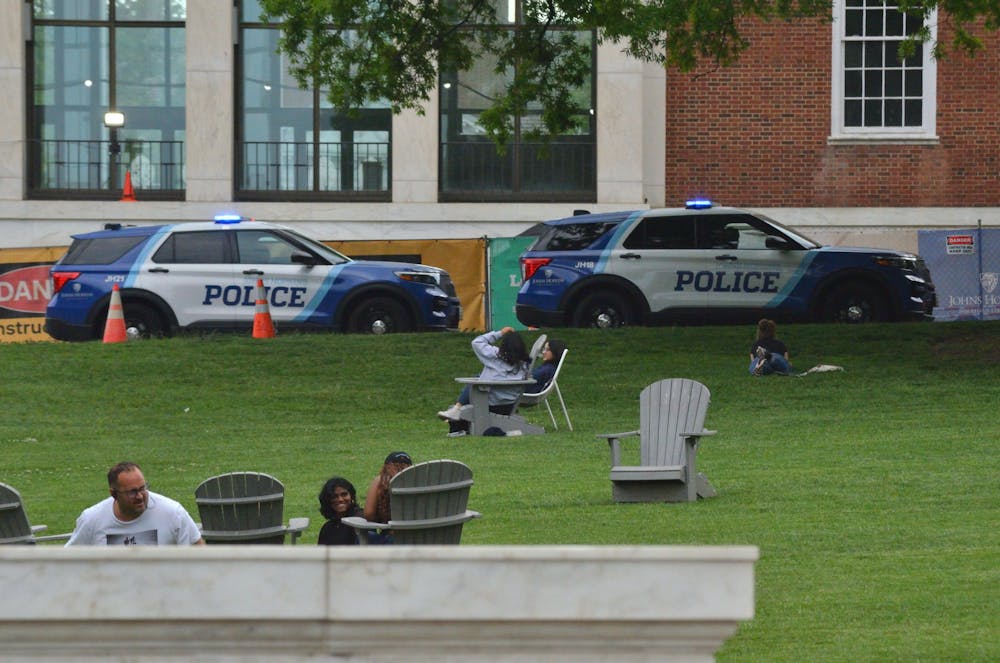At around 5 a.m. on May 8, the Hopkins Justice Collective (HJC) formed an encampment on Keyser Quad called the Dr. Hussam Abu Safiya Liberated Zone. Members of Johns Hopkins Public Safety and the Johns Hopkins Police Department (JHPD) responded to the encampment, dismantling the tents and dispersing the protesters.
Officers from the Baltimore Police Department (BPD) were also present. A spokesperson for the BPD stated to The News-Letter that the crowd dispersed without BPD involvement and referred comments to the JHPD.
In a statement to The News-Letter, a University spokesperson described the roles of the JHPD and Public Safety in dismantling the encampment.
“Just prior to 6:00 am [on May 8], after multiple attempts to de-escalate, Johns Hopkins Public Safety and Johns Hopkins Police Department officers dismantled several tents and dispersed a small group of protesters who had attempted to establish an encampment on the university’s campus,” they wrote. “From start to finish, the incident was resolved in under an hour, in an orderly and highly professional manner, and university officials on site observed no injuries.”
HJC is a pro-Palestine community organization that has been an active political presence on the Hopkins campus and is not a registered student organization. Last year, HJC participated in the Palestine Solidarity Encampment on The Beach from April 29 to May 12, and called for University divestment from companies with ties to the state of Israel — especially those involved in weapon production — among other demands.
In a press release, HJC outlined their reasons for forming the most recent encampment.
“Students launched the liberated zone to make our demands clear: Hopkins must cut ties with genocide, end JHPD and ICE on campus, and commit to science for humanity,” they wrote.
HJC continued by criticizing the University’s response to the encampment, particularly their use of armed police officers in dispersing protestors.
“Rather than engage with us in good faith, Hopkins called armed officers on the protest, not hesitating to use violence against any sign of dissent,” they wrote. “The University's reaction speaks louder than any official statement: Hopkins administration would rather send armed individuals to endanger their students than sit down with those asking for basic institutional accountability.”
HJC alleged that JHPD officers pulled the tent canopies onto students’ heads — causing injuries to protesters — and violated JHPD policies requiring force to be reasonable, necessary and proportional. On their Instagram, HJC provided photos of the alleged injuries to students, which included bruises.
In an email to The News-Letter, a University spokesperson refuted HJC’s claims, citing them as a “false representation of what occurred.”
“HJC was informed several times that the attempted occupation violated university policy and constituted an unauthorized use of university property,” the spokesperson wrote. “The group was on notice that they were trespassing and in violation of law and policy and were given repeated opportunities to dismantle the encampment and depart the quad and refused to do so.”
The University spokesperson also stated that officials on the site observed no injuries to protesters, but that a review is underway to confirm this. They then explained that encampments violate University policy and that involved students will face disciplinary action, including suspensions.
“Encampments on our campus are a clear violation of our rules, are disruptive to the learning environment and campus experience, and are inherently unsafe for both the participants and the university community,” they wrote. “We take this matter very seriously: the incident is under investigation and all participants will be subject to our disciplinary processes, up to and including suspensions or bans from campus.”
On May 9, in a community-wide email, Vice Provost for Student Affairs Rachelle Hernandez and Chief of Police for the JHPD Branville Bard sent out a community email providing details about the encampment and the University’s response. Hernandez and Bard emphasized that, while Hopkins supports the right to demonstration, it does not permit violations of campus policy.
“Johns Hopkins supports free speech, including protest and demonstration. But encampments are not how we engage with one another as a community. [...] HJC is not a recognized student organization, and their members have repeatedly violated university policies,” the email stated.
Hernandez and Bard also mentioned that HJC’s protest chants and methods are also under investigation for violations of student conduct.
“Johns Hopkins does not tolerate antisemitism or other forms of group hatred and discrimination. [...] Thursday’s incidents are under investigation by the Office of Student Conduct for violations of our protest and demonstration policies, and the group’s actions, chants, and signage are being assessed by the Office of Institutional Equity for potential threat, harassment, intimidation, or discrimination under Title VI,” they wrote.
Hernandez and Bard also announced that a smaller group of HJC members attempted to occupy another space in the afternoon following the encampment, and departed after being asked to do so. A University spokesperson provided details regarding the alleged second encampment attempt in an email to The News-Letter, noting that the group returned “fully masked” and “with what appeared to be supplies.” This, according to the email, is “not permitted” without “prior approval.”
“An unauthorized gathering of this kind during final exams is disruptive and disrespectful of the university community,“ the spokesperson wrote. “Student affairs and public safety again reminded the group of campus rules and they dispersed without further incident.”
In an email to The News-Letter, HJC refuted the University’s claims, explaining that the afternoon gathering was not an attempt at a second encampment.
“[The] event in the afternoon did not involve any of the equipment (tents/canopies which may be easily mistaken for an occupation) that were used in the morning,” they wrote.





